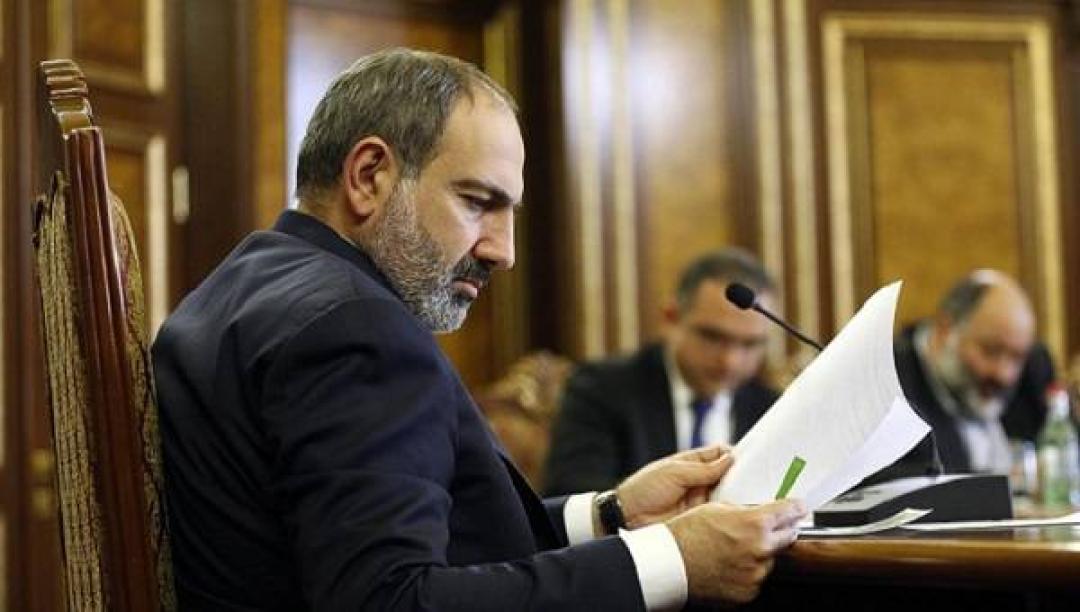
Pashinyan speaks about the negotiations on the Nagorno-Karabakh conflict

On 3 November, the Armenia Prime Minister Nikol Pashinyan spoke on Facebook to the Armenian people on the current relations with the de-facto Nagorno-Karabakh political elites and also about the negotiations with Azerbaijan.
He said that the “conspiracies in the Nagorno-Karabakh conflict settlement are excluded,” claiming that former government officials “have been spending millions [of dollars]” on disinformation aimed at discrediting his government.
He also noted that in the existing situation in current Armenian-Azerbaijani relations always contains dangers, but added that they are not more than they were 3, 4 or 5 years ago. “During the past one and a half year we have registered [a] sharp reduction of tension but it does not mean that the tension does not exist anymore. Unfortunately, we are having victims now too,” he said, adding that Armenia’s and the de facto Karabakh’s political elite’s approaches on the conflict settlement are similar.
“My [plan] is to search and find… a solution acceptable for the people of Armenia. After [the[ formulation of [an acceptable] solution … for the people of Armenia, I will present it. Pan-national discussion and pan-national decision will follow it. If necessary, the decision will made via referendum,” Pashinyan stressed.
Armenia’s Minister of Foreign Affairs Zohrab Mnatsaknayan also neglected the thesis that the negotiations are in a deadlock. “We permanently work in collaboration with the Minsk Group co-chairs and Personal Representative of the OSCE Chairman-in-Office Andrzey Kasprzyk. This is a process in which the countries work themselves, with the negotiation process being guided on the level of those countries' leaders. Hence it is just misunderstanding to state primitively that the leaders do not meet, and there isn't any negotiation process in question,″ he said. Mnatsakanyan also said that he believes that the process can gain a rapid momentum in case of demonstrating a "constructive approach”. He also admitted the importance of reducing the risks of frontline escalations and warned about the detrimental impact of Azerbaijan's policy of hatred. “Yes, there are ceasefire breaches but the violations, all in all, have decreased in number. And that is an absolutely important issue for us,″ he concluded.
On 31 October, Russian Minister of Foreign Affairs Sergey Lavrov met with OSCE Secretary General Thomas Greminger in Moscow to discuss possible measures to progress the peace talks in the Nagorno-Karabakh conflict. They discussed the swap of detained persons, the exchange of bodies of the dead and mutual trips of journalists in order to slightly defuse the situation and promote an atmosphere of trust. “Regarding the journalists, there is a dialogue through the mediation of the OSCE Secretariat, there is a hope. The situation with the detainees is less optimistic. We should move in this direction,” Lavrov said.
Greminger stated that the dynamics of the negotiations may have slowed down a little, but OSCE hopes that the meeting of the Armenian and Azerbaijani foreign ministers, which is planned as part of the 26th OSCE Ministerial Council meeting in Bratislava (Slovakia) on 5-6 December, would activate positive dynamics.
On 15 October, Vitaly Balasanyan, the former secretary of the national security council for the so-called Nagorno-Karabakh Republic accused Pashinyan of pursuing a broad autonomy for Nagorno-Karabakh within Azerbaijan as definitive solution to the conflict (Caucasus Watch reported).
See Also


Simonyan: “Armenia Should Trade with Turkey and Azerbaijan Instead of Closing Borders”

Mirzoyan Meets US Deputy Assistant Secretary Joshua Huck

Azerbaijani President Holds Talks with UAE and German Business Delegations on Economic Cooperation

Grigoryan Confirms Armenia’s Readiness to Dissolve OSCE Minsk Group Upon Peace Treaty Signing

